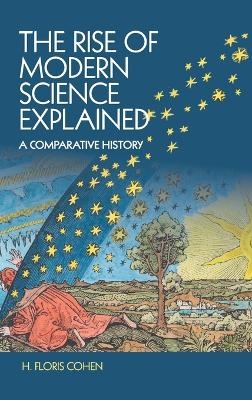
The Rise of Modern Science Explained
Cambridge University Press (Verlag)
978-1-107-12006-8 (ISBN)
For centuries, laymen and priests, lone thinkers and philosophical schools in Greece, China, the Islamic world and Europe reflected with wisdom and perseverance on how the natural world fits together. As a rule, their methods and conclusions, while often ingenious, were misdirected when viewed from the perspective of modern science. In the 1600s thinkers such as Galileo, Kepler, Descartes, Bacon and many others gave revolutionary new twists to traditional ideas and practices, culminating in the work of Isaac Newton half a century later. It was as if the world was being created anew. But why did this recreation begin in Europe rather than elsewhere? This book caps H. Floris Cohen's career-long effort to find answers to this classic question. Here he sets forth a rich but highly accessible account of what, against many odds, made it happen and why.
H. Floris Cohen studied history at Leyden University. He is Professor of Comparative History of Science at Utrecht University, where he serves as the Editor of the History of Science Society (journal: Isis). He first explored the rise of modern science by way of writing Quantifying Music (1984), and examined how other historians conceived of the rise of modern science in The Scientific Revolution: A Historiographical Inquiry (1994). He solved the problem of how modern science arose in How Modern Science Came Into the World: Four Civilizations, One 17th-Century Breakthrough (2010), of which the present volume is a shorter version, written in a different tone of voice for a larger academic public.
Introduction: the old world and the new; 1. To begin at the beginning: nature-knowledge in Greece and China; 2. Islamic civilization and medieval and Renaissance-Europe; 3. Three revolutionary transformations; 4. A crisis surmounted; 5. Expansion, threefold; 6. Revolutionary transformation continued; Epilogue: a look back and a look ahead; Timeline 1: pre-1600; Timeline 2: 1600–1700; Literature; Provenance of quoted passages; Index.
| Erscheint lt. Verlag | 24.9.2015 |
|---|---|
| Zusatzinfo | 3 Tables, black and white; 7 Halftones, unspecified; 8 Line drawings, unspecified |
| Verlagsort | Cambridge |
| Sprache | englisch |
| Maße | 152 x 229 mm |
| Gewicht | 580 g |
| Themenwelt | Geschichte ► Teilgebiete der Geschichte ► Technikgeschichte |
| Naturwissenschaften | |
| ISBN-10 | 1-107-12006-3 / 1107120063 |
| ISBN-13 | 978-1-107-12006-8 / 9781107120068 |
| Zustand | Neuware |
| Haben Sie eine Frage zum Produkt? |
aus dem Bereich


